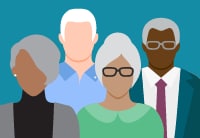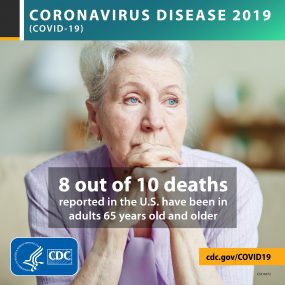Older adults, 65 years and older, are at higher risk for severe illness. COVID-19 is a new disease and we are learning more about it every day.
What you can do

If you have a serious underlying medical condition:
- Stay home if possible.
- Wash your hands often.
- Avoid close contact (6 feet, which is about two arm lengths) with people who are sick.
- Clean and disinfect frequently touched services.
- Avoid all cruise travel and non-essential air travel.
- Call your healthcare professional if you have concerns about COVID-19 and your underlying condition or if you are sick.
- For more information on steps you can take to protect yourself, see CDC’s How to Protect Yourself
Stress and coping
Older people are at higher risk for severe illness from COVID-19 which may result in increased stress during a crisis.
Fear and anxiety about the COVID-19 pandemic can be overwhelming and cause strong emotions.
Things you can do to support yourself
- Take breaks from watching, reading, or listening to news stories and social media. Hearing about the pandemic repeatedly can be upsetting.
- Take care of your body. Take deep breaths, stretch, or meditate. Try to eat healthy, well-balanced meals, exercise regularly, get plenty of sleep, and avoid alcohol and drugs.
- Make time to unwind. Try to do some other activities you enjoy.
- Connect with others. Talk with people you trust about your concerns and how you are feeling.
- Call your healthcare provider if stress gets in the way of your daily activities for several days in a row.
8 out of 10 deaths reported in the U.S. have been in adults 65 years old and older

Among adults with confirmed COVID-19 reported in the U.S.:
- Estimated percent requiring hospitalization
- 31-70% of adults 85 years old and older
- 31-59% of adults 65-84 years old
- Estimated percent requiring admission to intensive care unit
- 6-29% of adults 85 years old and older
- 11-31% of adults 65-84 years old
- Estimated percent who died
- 10-27% of adults 85 years old and older
- 4-11% of adults 65-84 years old
https://www.cdc.gov/coronavirus/2019-ncov/specific-groups/high-risk-complications/older-adults.html
-

1 COVID-19 in minority communities prompt doctors to tell patients to look for racial health disparities
-

2 Experts raise concerns about health issues outside of COVID-19 pandemic
-

3 COVID-19 in minority communities prompt doctors to tell patients to look for racial health disparities
-

4 Gov. DeWine pushing for changes to racial inequality in health amid COVID-19
-

5 Why are more men dying of the Coronavirus? A history of avoiding the doctor might be to blame (Dispatch)
-

6 National Coronavirus updates: Leaders fear virus could spread rapidly during protests (WXII12)
-

7 Cuomo calls for end to inequality in healthcare (Patch)
-

8 U.S. high ranking for obesity, diabetes, heart disease not a good mix with coronavirus.
-

9 Inequality in the built environment underlies key health disparities in physical activity and obesity.
-

10 COVID-19 could lead to an epidemic of clinical depression, and the health care system isn’t ready for that, either

